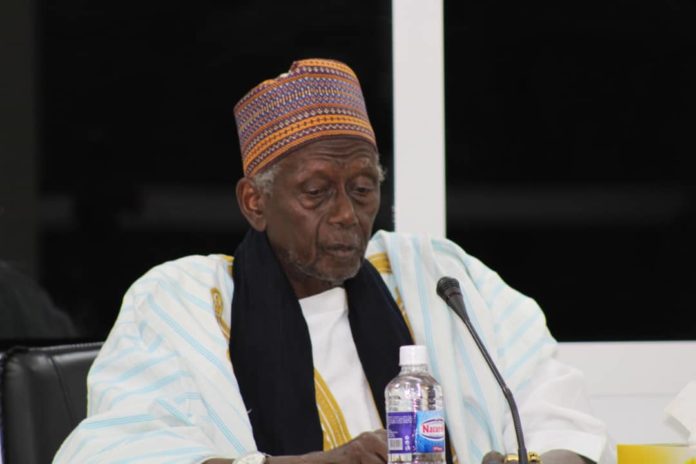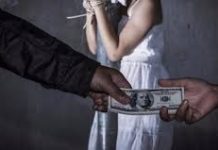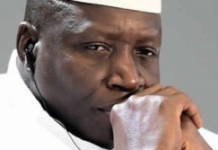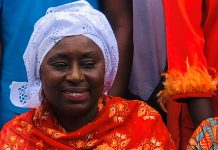By Yankuba Jallow
A veteran politician and former minister in the PPP regime, Momodou C. Cham commonly known as MC Cham has on Monday appeared before the TRRC as the first witness of the second session of their sittings.
Before he commenced his testimony, the chairperson of the Commission (TRRC) Dr. Sise told the audience that yesterday was the beginning of the second session of their hearings and it would focus mainly on the November 1994 incident. He said the previous session was about July 1994 coup were 13 witnesses most of whom are serving or retired security officers of the Gambia security forces. He stated that the evidence given before the Commission would help them in determining the main players, institutional failure and policy lapses during existing that time.
“Each session will last for three weeks,” he said.
He emphasized that the TRRC was established by virtue of an Act of the National Assembly and the activity of the Commission is a victim center exercise. He promised that this principle shall be the core of their activities contrary to others portraying the Commission as a witch hunt against an individual.
Dr. Sise further discouraged people using public media to contradict evidence given before the Commission. He said the TRRC has the mandate to afford persons who are adversely mentioned by witnesses a chance to be heard either in person or through writing to the Commission.
MC Cham said he was an employee of the Gambia Police Force attached at the Department of Immigration at the pay and quarter master’s office. He said he resigned in the year 1961 and ventured into politics. He explained that he joined the United Party and contested in 1962 general elections in the Tumana Constituency and won. He averred that he has been wining in elections in that Constituency for 30 years.
He told the Commission that he was part of the UP delegation that went to the Marlborough House in the UK to discuss the independence of The Gambia and his party wanted a monarchial system of government whereas the PPP wanted a republican government. He said at the Marlborough House, the composition of the Executive and the Legislature were discussed.
He adduced that Sir Dawda Jawara was the only veteran politician who was untested because he came from his studies abroad and ventured into politics.
He stated that he joined the PPP when the leadership of the UP became vacant after the demise of Edirisa Njie. He said before he joined the PPP, he was approached by the UP to be the party leader but he declined owing to the fact that he couldn’t dear to challenge the other party leaders; the likes of Reverend JC Faye and others whom according to the witness were veteran politicians. He said he considered himself as a young politician and he does not have a strong financial status to take up the leadership of the UP.
After he joined the PPP, the witness said President Sir Dawda Kairaba Jawara (as he then was) made him a member of many arms of his party (PPP). He said he has held different ministerial positions in the PPP government including the Minister of Finance and Trade (1977-81), Works and Communication (1987-90) and Education, Youth and Sports for five years.
He told the Commission that Edward Singhatey’s father named Saiba Singhatey who after converting to Christianity was given the name Gabriel Singhatey was his school mate in Basse and was more like a brother to him. He said Edward, Peter and their brother were all living in his residence at Pipeline for free.
“I gave them an apartment and these people were very nice people especially to my family,” he said.
He said he was a leading figure in the funeral arrangements of Edward’s father who died before the July 1994 coup took place.
He stated that after the July 1994 coup d’état, Edward took his family to residence near the Pipeline Mosque believed to be owned by one Daddy Jobe. He said that place was used by the Nigerian Commander.
“I was disappointed when I heard Edward Singhateh was one of the leaders of the July 1994 coup considering his family background,” he said.
He said he felt devastated because he knew the country was going into the wrong hands and it was going backward. He said the coup was such that the educated people did not partake in it.
He said weeks after the coup d’état, he was arrested over comments he made on the media following an interview with one journalist. He said in that interview, he had mentioned some of the achievements that their government made including the establishment of the Gambia Armed Forces, Gambia Gendarmerie, ferry services, roads, and schools among others. He said he was arrested and detained at the Banjul Police Station without any charges. He added that searches were conducted in his residence by the Junta and they took documents as well as books. He explained his several arrests by the Junta. He said he felt humiliated, dehumanized and disgraced by the arrests considering his background.
“I was detained in a cell alongside common criminals at the Banjul Police Station,” he said.
He said his second detention came about with an allegation that he convened an anti-APFRC meeting. He added that his detention came about when he was alleged to have asked businessmen and women to close down their shops because there was an ongoing coup.
In describing the conditions of the police cells, he said they were damning, filthy, dark and smelly.
He said in the year 1994, two of his properties in Banjul and Fajara were confiscated whilst he was under detention. He stated that his family were sent out and they were only able to take out their personal belongs including their clothing. He said this was a time when he newly installed six (6) air conditioners in those houses. He said the two properties were not sold but were used by the Junta as a residence for people as a result when they were advised to move, they took along many valuable things including 60,000 cement blocks, the doors and the corrugated iron sheets.
He said in October 1995, he was arrested and detained at the Fajara Barracks alongside Omar A. Jallow alias OJ and Ousainou Njie. He said at the time they reached the Barracks, they found other civilian detainees who were seated on the wet ground because on that day it rained.
Cham adduced that one Almamo Manneh who was soldier severely tortured him with until he bled severely.
“My back was aching and bleeding,” he said.
He maintained that the soldiers asked them to remove their clothes. He said they were kicked and beaten by the soldiers with the use of sticks. He said among the detainees were cement block makers who were not Gambians. He added that the women who were also detained at the Barracks suffered the same torture or more than what was meted on the men.
He said after the coup d’état, he saw Edward only twice, at the Fajara Barracks and a super market after his release.
He gave details that Lawyer Ousainou Darboe, the current Vice President of The Gambia was also brought in as a detainee but for about a month or two even though he has not been tortured in their presence.
He elucidated that some religious leaders including Imam Baba Leigh came to the Fajara Barracks and told them (the detainees) that they were sent by the Junta and expressed regret over their detention because they were important personalities in the society. He said Baba Leigh and the team called on them to desist from politics after their release. Thereafter, the witness said they were released.
He said he was rearrested in the year 2006 and detained at Cell number 4 of the Maximum Security Wing Number One of the Mile II Prisons. He said he was not allowed the services of a lawyer and his family wasn’t allowed visitations. He said he was tortured at the NIA. He described the food served at the Mile II as a very terrible food that he couldn’t gulp.
On his recommendation to the Commission, the veteran politician said employment opportunity should be but by merit. He said freedom of the press is paramount in every democratic society and if the mass is denied their right to access information, no meaningful development can take place. He said labour must be adequately rewarded and there should transparency and accountability in the governance of the country.





















